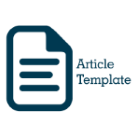A New Era of Leadership: Emotional Intelligence, Self-Reflection, Agility
Abstract
Keywords
Full Text:
PDFReferences
Alresson, M., Blom, M., & Sveningsson, S. (2016). Reflective leadership: Organizing in an imperfect world. Sage Publications.
Argyris, C., & Schon, D. A. (1978). What is an organization that it may learn. In C. Argyris & D. Schon (Eds.). Organisational learning: A theory of action perspective (pp. 8-29). Addison-Wesley.
Basim, M. K. A, & Amina, O. (2023). The effects of emotional intelligence on leadership effectiveness (A prospective case study of three industrial companies in Iraq). Journal of Positive Psychology & Wellbeing, 7(2), 988-1006.
Boud, D., Cressey, P., & Docherty, P. (2006). Productive reflection at work: Learning for changing organizations. Routledge.
Bradberry, T., & Greaves, J. (2009). Emotional intelligence 2.0. San Diego, CA: TalentSmart.
Brown, J. (2006). A leader’s guide to reflective practice. Trafford.
Coronado-Maldonado, I., & Benitez-Marquez, M. D. (2023). Emotional intelligence, leadership, and work teams: A hybrid literature review. Heliyon, 9, 1-19.
Cornelia, S. D. (2023). Comparative study on the level of empathy and emotional intelligence in adult life. Journal of Psychological Science and Research, 3(1), 1-6.
Cressey, P., Boud, D., & Docherty, P. (2006). The emergence of productive reflection. In D. Boud, P. Cressey, & P. Docherty (Eds.). Productive reflection at work: Learning for changing organizations (pp. 11-26). Routledge.
Ellstrom, P. E. (2006). The meaning and role of reflection in informal learning at work: Learning for changing organizations. Routledge.
George, B. (2012). A new era for global leadership development. Havard Business Review. Retrieved from https://hbr.org/2012/02/a-new-era-for-global-leadership.html.
Groves, K. S., & Feyerherm, A. E. (2022). Developing a leadership potential model for the new era of work and organizations. Leadership & Organization Development Journal, 43(6), 978-998.
Joiner, B., & Joseph, S. (2007). Developing agile leaders. Industrial and Commercial Training, 39(1), 35-42.
Kross, E., & Ayduk, O. (2017). Self-distancing: Theory, research, and current directions. Advances in Experimental Social Psychology, 55, 81-136.
Lamba, S. V., Jagadeesh, M., & Deshpande, A. (2023). Emotional intelligence as the core of intelligence: A perspective based on the Bhagavad Gita. Pastoral Psychology, 72, 65-83.
Lanaj, K., Foulk, T. A. & Erez, A. (2019). Energizing leaders via self-reflection: A within-person field experiment. Journal of Applied Psychology, 104, 1-18.
Madeline, O., Ashford, S. J. & Bindl, U. K. (2020). The power of reflection for would-be leaders: Investigating individual work reflection and its impact on leadership in teams. Journal of Organizational Behavior, 44, 19-41.
Mayer, J. D., & Salovey, P. (1997). What is emotional intelligence? In P. Salovey & D. J. Sluyter (Eds.). Emotional development and emotional intelligence: Educational implications (pp. 3-34).
Mehta, S., & Mckenna, K. (2020). The 4 essential leadership roles of every career journey. Retrieved from https://www.ccl.org/articles/leading-effectively-articles/4-leadership-roles-successful-professional-must-play.
Muafi, Q. U. (2018). Leadership agility, the influence on the organizational learning and organizational innovation and how to reduce imitation orientation. International Journal for Quality Research, 3(2), 467-484.
Neal, S. (2020). Seven top leadership development challenges post-Covid. Retrieved from https:www.ddiworld.com/
Niewerth, C. (2020). 11 skills leaders will need for the new era of work. Retrieved from https://www.siliconrepublic.com
Pei, M. (2018). A play for global leadership. Journal of Democracy, 29(2), 37-51.
Pennebaker, J. W. (1997). Writing about emotional experiences as a therapeutic process. Psychological Science, 8, 162-166.
Ray, S. K. S. (2023). Moving towards agile leadership to help organizations succeed. The IUP Journal of Soft Skills, 17(1), 6-17.
Renjen, P. (2019). The 4 types of leader who will thrive in the Fourth Industrial revolution. World Economic Forum. Retrieved from https://www.weforum.org/agenda/2019/01/these-four-leadership-styles-are-key-to-success-in-tge-fourth-industrial-revolution.
Schon, D. A. (1983). The reflective practitioner: How professionals think in action. Basic Books.
Sharwa, S., & Tiwari, V. (2023). Emotional intelligence and career success: Does resilience matter? Global Business and Organizational Excellence, 42(6), 138-153.
Shepherd, N. A., & Smyth, P. J. (2012). Reflective leaders and high performance organizations. I Universe.
Smith, A., & Shaw, P. (2011). The reflective leader. Canterbury Press.
Ulrich, D., Cressey, P., & Docherty, P. (2006). Productive reflection at work: Learning for changing organizations. Routledge.
Wong, C. S., & Law, K. S. (2002). The effects of leader and follower emotional intelligence on performance and attitude: An exploratory study. The Leadership Quarterly, 13(3), 243-274.
Copyright (c) 2024 Jurnal ILMI
This is an Open Access article distributed under the terms of the Creative Commons Attribution-NonCommercial-NoDerivatives 4.0 International (CC BY-NC-ND 4.0), permitting copy and redistribute the material in any medium or format.


